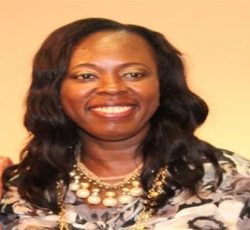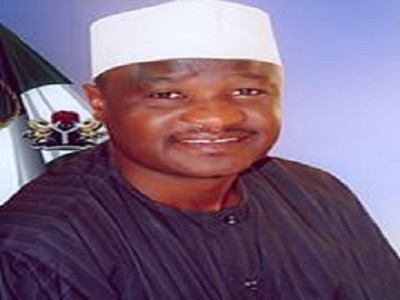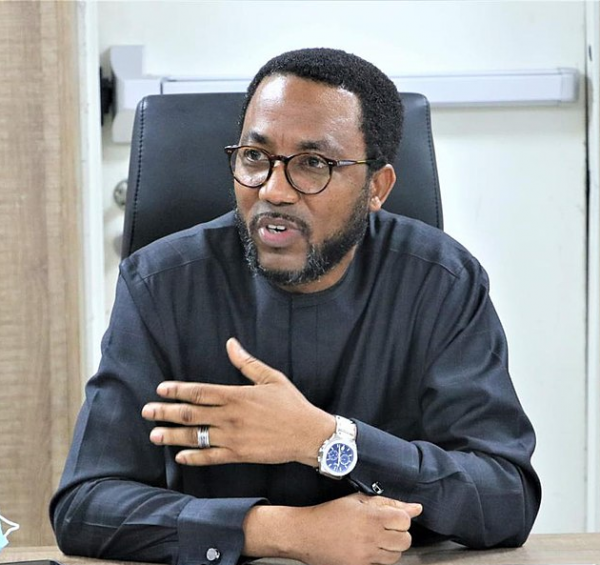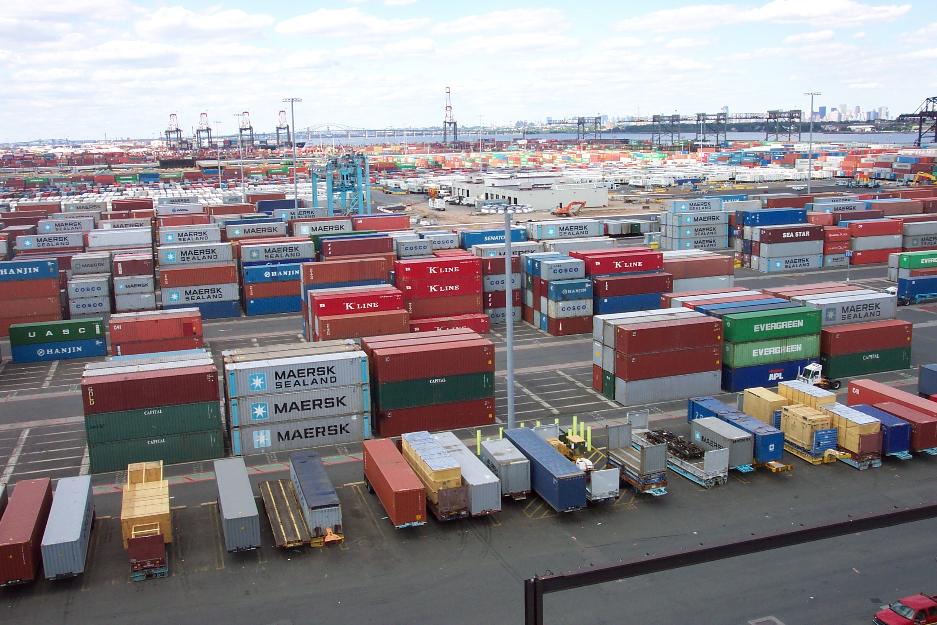IAPH Regional Conference Can Address Nigeria’s Transport Woes- NPA MD
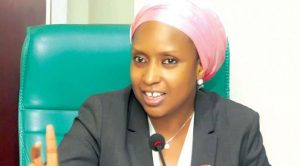
The Managing Director of Nigerian Ports Authority (NPA) recently held a press conference where she spoke extensively on the opportunities for Nigeria in the upcoming the International Association of Ports and Harbours (IAPH) Conference scheduled to take place in Nigeria. MMS Plus brings you the full text as well as her responses on several maritime sector issues. Enjoy it:
Nigeria is hosting the first African Regional conference of the International Association of Ports and Harbours (IAPH) in Abuja between September 17 and 19, 2019. The conference with the theme: “African Ports and Hinterland Connectivity”, will be declared open by President Mohammadu Buhari under the chairmanship of the former head of state, Gen. Abdulsalam Abubakar (Rtd.)
The theme was chosen in recognition of the importance of ease of cargo transfer from port to the destination of use. For ports in the region, I think their potentials is in the deployment of multi-modal means of transportation to ensure that cargoes are moved to the satisfaction of the clients.
Before I proceed to share information about the conference with you, let me first thank you for your cooperation over the past two years. Your support has encouraged us in the pursuit of our aspirations for an efficient and optimal maritime industry and I also want to use this opportunity to plead with you to continue to support us. In August 2017, I was elected as the Vice President of the International Association of Ports and Harbours (IAPH) by the associations, regions and honourary members. The 61 year old association was formed to promote global interest of ports worldwide and to build a platform where ideas on international best practices with regards to port operation can be shared. This is the first time Nigeria is been the Vice President of the African Region. I saw the elections as an opportunity to polish the representation of the sector and collaborate with colleagues across the globe to reposition the maritime sector for better efficiency. From presentations and discussions that I have been part of at IAPH, we have seen the need for African stakeholders to come together in order to chart the course for the development of ports in the regions. I’m happy to report that these deliberations in the last one year birthed the first African IAPH conference with the theme; African Ports and Hinterland Connectivity.
For the three days during the event, stakeholders ranging from port administrations, maritime agencies, among which we have operators from neighboring ports in Africa. Port Authorities from South Africa, Egypt, Morocco, Kenya, Cote’de Voire, Senegal, among others would be present. We would be sharing ideas and experiences on how to improve port operations and ensure efficiency. Experts from international organizations such as the World Trade Organization (WTO), International Maritime Organization (IMO), United Nations Conference for Trade and Development (UNCTAD) and African Development Bank (AfDB) would share latest ideas and best practices to enable us enhance our respective port operations. At the end of the conference, we are hopeful that we would be able to produce a document which could for the basis of policies that would guide our governments in the very important task of improving policies that concern the affairs of African ports. Let me seize this opportunity to thank Nigeria’s President Mohammadu Buhari and the Minister of Transportation, Rt. Hon. Rotimi Amaechi for the tremendous support they have given this conference. I also want to recognize and appreciate our lead sponsors like Integrated Logistics Services (INTELS), Dangote Group, African Circle, Starz Marine, Nigerian Maritime Administration and Safety Agency (NIMASA), Lekki Port, among others. I want to thank all the sponsors and I look forward to a successful conference.
We intend to have clear policies in terms of hinterland connection with the seaports. The situation we have in Lagos with the traffic gridlock in Apapa emphasizes the need for such intermodal connection and intermodal transportation system for cargo evacuation. WE believe that this is the singular solution to decongestants any port. As long as we continue to have high volume of trucks plying the port access roads, we would continue to have this congestion. We should be able to make the government understand that prioritizing hinterland connection is paramount for any port to operate efficiently. The notion that ports should be isolated from hinterlands seems to be what our government understands. NPA has been mandated to ensure optimum efficiency of the ports but there are no provisions for the hinterlands. The issues such as railways and inland waterways are issues that would be addressed at the conference. Recently, I got the president to give a directive that the ongoing rail rehabilitation and expansion should ensure that all the ports are linked to the railways. This was not in the original plan. I also brought it to the attention of the Ministry of Works that there was a need to prioritize the port access roads. We have also noted the need to utilize the Inland waterways using barges for evacuation of cargoes and ensuring that the National Inland Waterways Authority (NIWA) prioritizes it’s operational capacity by dredging some of the river ports and ensuring that the routes are navigable. We believe that the recommendations from this conference would further reiterate these issues. If Nigeria doesn’t make the crucial policy decision to prioritize hinterland connection, the ports would never be efficient. When I was in Netherlands with the President, I asked the Chief Operating Officer of the Rotterdam port about connections to the hinterland. I did it on purpose so that the President could hear that a port that doesn’t have connection to the hinterland for cargo evacuation cannot be efficient. He stressed this point and I explained to the President that we needed to prioritize connection to hinterlands for Nigerian ports to be more efficient.
Let me digress a bit. When you look at the transshipment cargo that we aren’t able to capture in Nigeria, the problem is attributable to that. For the portion of cargoes made for the hinterland in neighboring countries, Nigeria needs smooth linkages and connections. There should be proper connections from Lagos ports all the way to Kano; this would enable the importers route their cargoes from the foreign countries straight to their destinations in Kano or other parts of the country as well as neighboring countries like Niger and Chad. There is a large portion of cargo that the country isn’t getting because of the challenges with the connectivity. These are some of the issues that the IAPH conference would be addressing. The government needs to understand that despite the volume of investment in infrastructure at the ports, if there aren’t proper linkages via the railway and inland waterways, we haven’t achieved anything. This factor is important to balance import and export. Nigeria is prioritizing export of non-oil produce, solid minerals, among others; but there is also need to create connections to the hinterland where these items are produced or where the solid minerals are found. How do you export items when there is no connection from the locations of mineral resources or produce to the ports. The conference would enable us get the government to appreciate these issues especially as foreign players would be highlighting the issues at the conference. It also affords the participating nations an opportunity to share experience of port operations especially on how they have been able to achieve evacuation of cargoes to the hinterland. There are several challenges at sea, although the National Inland Waterways Authority (NIWA) is striving to drive the river ports. How much cargo is coming in to sustain the level of dredging vis-a-vis rotation. There needs to be feasibility study on cargo traffic in these locations to justify the volume of dredging to be done in the river ports. We want to find out what our sister countries did when they were developing their inland waterways and river ports. Nigeria can avoid making the same mistakes our sister countries have made. We can learn from their mistakes and leapfrog such challenges to a successful outing. This regional conference has several other benefits and I must add that when we revealed intentions to have this conference it was received with such excitement because no other region had thought about having a conference like this. So, beyond being the first for the African region, it is also exciting because other regions haven’t had such strategic conference to chart the course of their economies. One of the things that is important is that one just doesn’t talk but act. When I was contesting for the position of Vice President IAPH, I promised that we were going to hold this conference and some people thought it was something I said to get into the office. However, I ensured that I put in place the mechanisms to ensure that this conference takes place.
Dry Ports
NPA is providing all necessary support for the development of dry ports in the country. Recently, I met with Kaduna Dry Portal we discussed certain areas of collaboration and we are providing them with all necessary support. We also noted and we are curious as to why the Nigerian Shippers’ Council (NSC) is supervising the creation of dry ports. It isn’t in their mandate. However, we are working with them as well as the operators of the dry ports to ensure that we provide whatever support they need for us.
Regarding inter-regional trade, we believe that Nigeria is a clear leader in the sub-region. We have looked at the access to countries via the Calabasas port, we have human cargo. We have daily inflow of cargoes in that area from Cameroon. So, regional trade is important but one of the crucial things is hinterland connection especially as it relates to transshipment of cargoes. At the end of the conference, we would be having an African regional meeting of IAPH and one of the things that would be deliberated is to ensure that the outcome of the meeting would be translated to the countries via the Heads of delegations that would attend.
Apapa Traffic Gridlock
When you have a problem that has been there for years despite several recognitions and resolutions, it would also take years to resolve it. The problem isn’t something that could be resolved speedily. Cargo evacuation via barges is one of the measures that we have commenced to reduce the pangs of congestion. ZWE have also encouraged the operators to evacuate cargoes using barges but we recognize the award of N32billion contract to fully reconstruct the Apapa road. NPA prioritizes the road especially as trucks are collapsing but the repairs would solve the issue. We also have empty container policy which is one of the immediate measures to reduce the number of empty boxes that are trying to the ports. We have looked at defining the period in which empty containers can go into the port to reduce congestion. Shipping companies and NPA would define the call-up time for empty containers and we have also looked at the possibility of going in with an empty container and coming out with a loaded container. These are some of the immediate steps we took to address the situation. Another thing is licensing trailer parks. I have met with Lagos State and I put up an advert seeking for people to come up with trailer parks so that we issue a license. With that license, all trucks must come there and we use a call-up system to call trucks from there. We advertised and received four bids but they didn’t show ownership of any trailer park. The custodian of the land is the Lagos State Government and we wrote to the Governor of Lagos as well as the Governor of Ogun State. We can license trailer parks in Ogunquit and they would only come into the Lagos ports when called upon because a large proportion of the trucks on the port road don’t have any business there. They just go to the port and hope for business and that is very irresponsible. They could go to the trailer park to source for businesses and clients can equally come to the park to get trucks. NPA doesn’t have the land and it actually out of our purview but we are seeking how we could collaborate with the State and Local Governments to establish trailer parks.
Government has the Tin Can Island Port trailer park which the Ministry of Works is constructing. The construction has taken so long and we have written to the Ministry to expedite the process and we also offered to pay for the shoreline. They said the contract that was awarded from the beginning included a shore protection so they could not do a fresh award for the shore protection.
Most of the nation’s cargo goes via the roads, we also have multiple tank farms and they use the roads when we could utilize piping. This problem underscores the need for interconnectivity to hinterlands but you need railways and the Nigerian rail doesn’t have the carriages and the number of coaches required.
When the Ministry of Transportation was working on the concession with General Electric (GE) for the railways, the project supposed to have started from the ports. However, the Ministry has started talks with another construction company for the rail connection to the seaports. We are already connected because Apapa is connected by rail but Tin Can Port has to be connected. GE was banking on the revenue to come from the port. They wanted to seize the investment from the nation but the Ministry is currently discussing with another company.
Lekki Masterplan
Government needs to recognize and understand these issues. For example, let’s look at the Lekki Deep seaport project. In ten years time, if left to develop without plan Lekki would be a big problem with a refinery, port and industrial city without connectivity via rail. It is interesting to note that before we took over there was no provision for rail connection out of Lekki. I found this strange because one couldn’t have a deep seaport without understanding the need for rail connection even in the design. It would take two years to build the ports but it would take five years to build the rail so the project should start with the rail. On my first meeting with Lekki port I asked for the rail connection but it wasn’t there but we have written to the Nigerian Railway Corporation (NRC) and introduced Lekki port. We rejigged the feasibility study to make provision for rail connection.
Similarly, we wrote to Dangote Refinery to ensure that there is provision for piping as a mode of evacuating products from the refinery so we don’t need to have numerous trucks taking products out of the refinery. There is also a Lekki Bypass that is going to be constructed in adding to the road the Lagos State Government is constructing, linking Lekki to Shagamu. So, Lekki must have pipeline for evacuation of products, it must also have rail connection and it must have additional modes of road transportation. The Lekki bypass and the Lagos State access road need to be prioritized. Some of these policy decisions that were not taken over ten years ago cannot be solved hurriedly when we are faced with the problems. Now it’s quiet in Lekki but in five years time it may not be quiet. Within those five years we can begin to construct the roads, rail and make provision for piping.
Warri Dredging
We went to Nigeria National Petroleum Corporation (NNPC) and I led the delegation to the Group Managing Director of NNPC, Dr. Maikanti Baru and he was very clear on where the pipelines would be and we constituted a committee on Nigerian ports and NNPC to discuss the relaying of the pipeline. So, I would rather take the position of the GMD of NNPC than the position of the local pilot in the Warriors area concerning where the pipelines are buried. NNPC are the custodians of the pipeline and they are in better position to know where the pipelines are buried. For us, it isn’t an issue. If the pipelines aren’t there we would dredge deeper. Why would we dredge 7.5meters when we can go to 10meters but I would rather take Baru’s words that the local operator in Warri. Baru is an engineer that has worked with the Corporation for over thirty years and I also believe NNPC is a competent organization with accurate facts and history. The institution of NNPC has more knowledge than the individual operator, just like NPA, I may be sitting in Abuja, but the Port Manager right there in Warri would tell me what is obtainable at the location and I would believe. I don’t need to sit in Onne or Calabar to know what goes on there. The institution is strong enough and historic knowledge domiciled in the institution needs to be used.
On the alleged award of contract for Excravos dredging, through the course of the procurement process we had a petition submitted to us that an ex-company that qualified has been convicted. Since we are aware that the party has been convicted and it was a partner in our joint venture, we submitted a conviction document to the Economic and Financial Crimes Commission (EFCC) and we also submitted the document to the Attorney General of Federation (AGF) drawing his attention to the fact that the company had been convicted, the issues for the conviction and the persons to whom money was paid to. The conviction is attributable to a payment that was made to certain individuals within Nigerian Ports Authority and the Federal Ministry of Transportation and other agencies to facilitate payment of invoices from NPA. The position they provided in the Swiss Court was that NPA refused to pay the JV invoices demanding for payment and they now made the payments and revealed the people they paid. They also listed in addition that they were asked to pay for security in Bonny by some militant groups to enable them have access to their wells and they also listed the people they paid the money. With that, the Swiss court sanctioned them and convicted them for making payment outside of the contract as it were in the JV and upon receipt of that conviction document we forwarded it to EFCC and AGF with the beneficiaries of those payments asking them to investigate further. A year later, a subsidiary of this company bids for a job with NPA and in the course of the tender process, there was a petition that they are also convicted so we sent them a letter and they sent us an affidavit that they weren’t the company that was convicted. We proceeded with the tender process and made submission to the Bureau of Public Procurement (BPP). BPP further directed us to do an independent investigation of the affidavit they submitted. We hired a law firm to do an independent investigation on the companies and after investigations we discovered that the current company is a subsidiary of the one that was convicted. Each company has a different figure personality and a different legal profile.
The company is independent of the former because it had a different legal profile. Just to clarify that, this company that has been driving this is also the same company that NPA cancelled their contract in Calabar. Recall that NPA terminated the Calabar dredging contract and the joint venture over claims by the company of $1billion for work that they didn’t do. We couldn’t verify the job so we terminated it and wrote them to refund the $12million that was paid to them. The company also engaged through a process that wasn’t in compliance with BPP. BPP had complained that the company violated the BPP Act and wrote to the President that he shouldn’t have signed the JV with the company that is petitioning the country. On one hand, I being mindful in ensuring that NPA complies with the BPP procedures and everything we do we submit to BPP to enable them guide us. Upon submission of the independent investigation, BPP also conducted their internal investigation and allowed us to proceed with the procurement process.




